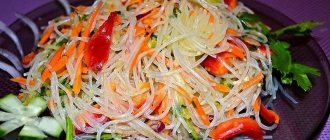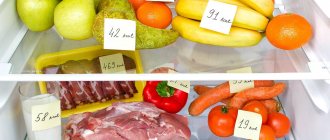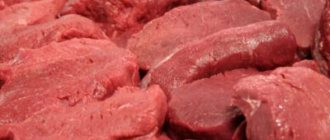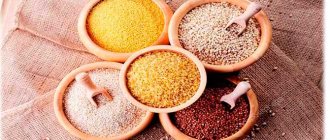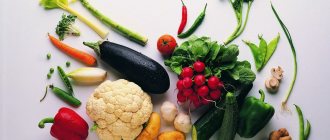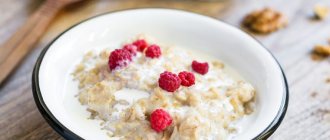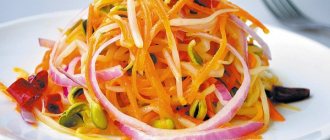Beetroot, or beetroot, is the second most popular vegetable, second only to potatoes. The sweetish root vegetable is used to prepare salads, first courses, drinks, snacks, winter preparations and even desserts. With proper storage and heat treatment, beets do not lose their beneficial properties. The vegetable has a beneficial effect on human health, primarily on the gastrointestinal tract.
- Beetroot appetizer with cheese
Compound
Raw, boiled and stewed beet practically does not differ in chemical composition. Experts have long proven that the product is useful in any form, because it is rich in natural substances vital for the normal functioning of all human organs and systems. The chemical composition of beets is presented in the table:
| Component Group | Compound |
| Vitamins | A, B₁, B₂, B₃, B₅, B₆, B₉, C, RR |
| Micro- and macroelements | Calcium, magnesium, potassium, iron, zinc, phosphorus, iodine, sulfur, copper, cobalt |
| Organic acids | Apple, lemon, oxalic |
| Amino acids | Histidine, arginine, lysine, valine, betaine, betanin |
| Organic sugars | Glucose, sucrose, fructose |
| Additionally | Antioxidants, pectins |
Beets contain a large amount of fiber, dietary fiber, protein compounds and complex carbohydrates that are beneficial for the body. The nutritional and energy value of beet depends on the variety and method of processing. Nutritionists usually indicate average BJU indicators, since the ratio of nutrients in fresh and thermally processed root vegetables varies slightly:
| The nutritional value | Indicators per 100 grams of product |
| Squirrels | 1.6-2.6 g |
| Fats | 0.1-0.2 g |
| Carbohydrates | 8.8-10.8 g |
| Calorie content | 40-49 kcal |
Boiled beets: benefits and harms
Boiled beets are easy to prepare, they can be stored in the refrigerator for several days (unpeeled for 7-10 days) and used if necessary.
Calorie content of boiled beets
Are boiled beets high in calories? No, the calorie content per 100 grams is 47 kcal.
For comparison: calorie content, fresh beets, 42 kcal.
Which beets do you like best?
Raw tastes better Boiled tastes best!
Composition and beneficial properties of boiled beets
Boiled beets contain most nutrients: choline, vitamins A, B1, B5, B6, C, E, H and PP, as well as minerals necessary for the human body: potassium, calcium, magnesium, zinc, iodine, phosphorus and sodium, present in plant folic acid and sufficient fiber. Based on the chemical composition, it becomes clear that boiled beets are beneficial for almost everyone. The product is one of the natural effective laxatives; in combination with vegetable oils, it can cure severe constipation. Boiled beets take part in the blood, replenishing blood loss, which is especially important for women with heavy menstruation. Boiled beets are beneficial for men - it has been proven that they increase sexual desire and increase male strength.
The presence of organic acids (tartaric, lactic, malic, oxalic and citric) plays an important role in the process of food digestion. The substance betaine helps lower blood pressure, participates in lipid metabolism, and reduces the number of cholesterol plaques on the walls of blood vessels. The property of beets cooked to remove heavy metals from solids is known.
Harm of boiled beets
Despite the obvious benefits of the product, boiled beets are not recommended for diabetics due to the high content of natural sugars, those with “weak” intestines and a tendency to gastric disorders, as well as for people with urolithiasis.
Beneficial features
In ancient times, people used only beet leaves with petioles, the so-called tops, for food, and only over time they realized that the maximum benefit can be obtained from eating root vegetables. They learned to boil, stew and bake, and use them as a main or additional ingredient in various dishes.
The benefits of the vegetable can hardly be overestimated, because beet has a beneficial effect on the functioning of almost all internal organs and systems of a person:
- stimulates the body's defenses and increases resistance to viral and bacterial infections;
- improves the functioning of the heart and blood vessels;
- participates in the process of hematopoiesis - increases hemoglobin, prevents the development of anemia;
- normalizes metabolic processes;
- lowers blood pressure;
- treats runny nose;
- serves as a means of preventing benign and malignant neoplasms;
- facilitates the condition of patients during radiation and chemotherapy;
- accelerates the elimination of toxins, free radicals and other harmful substances;
- stimulates the secretion of gastric juice;
- improves the functioning of the digestive system;
- prevents the development of atherosclerosis;
- enhances libido and increases potency in men;
- improves the general well-being of women during menstruation;
- has a mild laxative effect and helps with constipation;
- relieves inflammation on the skin and mucous membranes of internal organs;
- promotes cell rejuvenation and prevents premature aging.
As you can see, the range of beneficial properties of beets is quite large. Doctors recommend eating it for everyone - men and women, children and the elderly. Beetroot is especially useful for those who have problems with the digestive tract:
- for gastritis, boiled root vegetables relieve inflammation of the gastric mucosa and normalize its functioning;
- for problems with the liver, pancreas and intestines, it helps cleanse organs and restore their cells;
- for chronic and spastic constipation, it facilitates the process of defecation and accelerates the removal of feces.
If you have pancreatitis, you should absolutely not eat raw beets . But when boiled, the vegetable will benefit the body, only its daily dose should not exceed 100 g.
Recipes with beets
Vegetable salad
Ingredients:
- boiled beets,
- boiled carrots,
- boiled potatoes,
- green onion,
- low fat sour cream,
- salt.
Preparation:
- Finely chop the boiled vegetables and sprinkle with chopped green onions.
- Add salt to taste and season with low-fat sour cream.
Beet caviar
Ingredients:
- beet,
- carrot,
- vegetable oil,
- tomatoes,
- salt,
- pepper.
Preparation:
- Raw beets must be grated on a fine grater and fried in vegetable oil for 15 minutes.
- Then add grated carrots and a little water and simmer for 5 minutes.
- Finely chop fresh tomatoes and add to the beets, add salt and pepper to taste and cook until the dish is ready.
Classic vinaigrette
Ingredients:
- boiled beets,
- green peas,
- Boiled potatoes,
- boiled carrots,
- pickled cucumber,
- soaked cabbage.
Preparation:
- Finely chop the beets and carrots, add chopped potatoes, mix the cucumber, add peas and pickled cabbage.
- Salt and pepper are added to taste; season with vegetable oil.
Beetroot is a very common vegetable, which is used not only in cooking, but also for dietary nutrition. Using beetroot diets allows you to lose weight in a short time without causing damage to the body, while the vegetable helps cleanse you of toxins.
The low calorie content of the root vegetable allows you to use this product for nutrition even late in the evening as a snack, while there will be virtually no harm to your figure. However, if there are individual cases of intolerance to the components of the vegetable, you must be careful about its consumption.
Features of eating beets by pregnant women
Gynecologists recommend that pregnant women include a small portion of beets in their daily menu. Folic acid, contained in the pulp of the root vegetable, helps form a healthy nervous system for the baby. A universal low-calorie vegetable generally has a beneficial effect on the body of expectant mothers:
- effectively cleanses the intestines of putrefactive bacteria and feces, prevents the development of constipation;
- has a mild diuretic effect;
- lifts your mood and helps fight depression;
- increases the level of hemoglobin in the blood and prevents the development of hypoxia in the fetus.
During pregnancy, when almost all medications are contraindicated, beet juice is used in the complex treatment of sore throat, pharyngitis, laryngitis and rhinitis. To cure a runny nose, you need to instill 3-4 drops of undiluted freshly squeezed juice into each nostril several times a day. Regular gargling with a solution made from 1 part beetroot juice and 2 parts warm boiled water will help relieve a sore throat.
Benefits for weight loss
The introduction of beets into the diet promotes weight loss. But it is important to remember that diet alone will not achieve good results. To get the figure of your dreams, or at least get closer to it, you need to properly combine a balanced diet and exercise, follow a sleep and rest schedule, and drink enough water per day.
Helpful information! On average, a person should drink from 1.5 to 2.5 liters of water per day, depending on body type and weight. Drinks such as tea, coffee and juices do not count; we are talking about pure water.
Assimilation
The beneficial properties of beets are determined by one important feature - the body’s ability to absorb one or another component. Some tropical fruits, such as pineapple or mango, which should be beneficial, are simply not absorbed in the body of a Russian resident. But beets in this regard are a win-win vegetable, useful in any form: raw, boiled, stewed, baked.
Regarding the beneficial properties of beets for the body during weight loss, the following can be said. If you introduce red root vegetables into your daily diet, after just a couple of weeks of consumption you will notice an improvement in your well-being, which will be accompanied by the full functioning of all internal organs. And the most obvious change will be the state of the nervous system - excessive nervousness and irritability will disappear.
Taste properties
The vegetable itself is saturated with sweet glucose, which serves as a catalyst for improving mood (especially if it concerns sugar beets), but at the same time remains dietary. Glucose stimulates brain function, increases activity and supplies energy to the body.
But the most valuable element in the root vegetable for starting the weight loss process is considered to be betaine. This is a biological substance that is often used in the form of dietary supplements that are used for weight loss. The invigorating properties of natural juice from fresh beets have already been mentioned in the previous section.
In addition, betaine normalizes liver function, which is directly related to proper metabolism. In simple terms, if you want to speed up your metabolism, in addition to drinking water per day and exercising, eat beets. It will serve as a natural metabolic catalyst. When dieting or drying the body, which is closely related to taking large amounts of protein in food, betaine will promote more active absorption of protein in the intestines. Betaine accelerates the activity of fat oxidative processes - that is, fat deposits are burned many times faster.
Note: regular consumption of dietary beetroot dishes will not only help you lose weight, but will also prevent the accumulation of fat in the female and male body thanks to such an element as the polyphenol curcumin. This happens due to the properties of the component to suppress the growth of blood vessels in fatty tissues.
Cellulose
In addition, it is worth remembering the properties of fiber, which creates additional volume in the intestines without excess calories and suppresses the feeling of hunger. Another important point is lowering cholesterol and blood sugar levels.
You can make many dishes, drinks, cocktails, smoothies from beets; they are great for soups and salads. You can eat the root vegetable grated raw or after heat treatment, without worrying that the beets have lost their beneficial properties. The main thing is to prepare the product correctly.
© slawek_zelasko — stock.adobe.com
Benefits for children
Pediatricians recommend introducing beets into the menu of infants from 8 months of age. This vegetable practically does not cause allergies in children, but it improves intestinal motility, stimulates the growth of beneficial microflora, and prevents dysbiosis and constipation. Regular consumption of beets saturates the body with beneficial vitamins and microelements, improves the metabolism of fats and proteins and has a beneficial effect on the growing body.
Beetroot should be introduced into the children's diet gradually, starting with 0.5-1 tsp. in a day. The optimal time for complementary feeding is breakfast, so that during the day parents can assess the body's reaction to the new product. If there are no signs of allergy or intolerance to beets (abdominal pain, loose stools), the daily amount of beets can be increased to 4-5 tsp. puree a day.
Starting from one year old, children can already be given various dishes with beet:
- beetroot soup or borscht without frying;
- vinaigrette and other salads;
- vegetable stews;
- stewed or baked beets;
- casseroles;
- pancakes.
The daily amount of beets for children under 3 years of age should not exceed 50 g; for children from 4 to 7 years old, the daily amount can be increased to 100 g.
Using boiled beets for weight loss
The use of beets has gained great popularity for weight loss treatments. There are a large number of different types of diets for the main food product, in which this vegetable is taken.
Fasting days are very popular, during which only one beet is eaten almost the entire day. With daily consumption of vegetables, the metabolic process accelerates and weight decreases.
When using beetroot diets, a person eats a low-calorie product, while the feeling of hunger is satisfied for a long time, and the necessary energy appears.
The healthy root vegetable contains substances that block the growth of new fat cells and also trigger the natural burning of fat deposits.
Note! Another equally effective way to lose weight using root vegetables is to drink a glass of beetroot juice every day; this drink acts as a fat burner and helps to quickly achieve results.
Beetroot for weight loss
Supporters of a healthy lifestyle and proper nutrition must include beets in their diet. Thanks to its large amount of useful substances, it helps prevent vitamin and mineral deficiency in the body, which usually occurs when following various diets. In addition, regular consumption of vegetables helps restore normal metabolism and reduce weight.
Experts classify beetroot as a group of dietary products that promote weight loss. It is enough to eat several servings of beets a week to normalize the functioning of the gastrointestinal tract and activate metabolic processes.
Root vegetables belong to a small category of foods that are allowed to be eaten even at night.
Fasting days
When losing weight, the root vegetable is often used for fasting days. It is useful to arrange them no more than 1-2 times a week. Throughout the day, you are allowed to eat boiled beets (as a separate dish or in combination with olive oil) and drink beet juice.
The second menu option for a fasting day is beets with kefir. During the day, you are allowed to drink a fat-burning cocktail made from 1 kg of boiled root vegetables and 1.5 liters of kefir. All ingredients are mixed with a blender, then the total volume of the cocktail is divided into 6 servings, which are drunk every 2-3 hours throughout the day.
Beetroot diet
Those who want to lose weight often use a beetroot mono-diet, designed for 7 days. The menu may only include dishes made from beets in combination with some low-calorie foods:
- beet and carrot soup;
- dietary salad of raw or boiled root vegetables with the addition of garlic, herbs, a spoon of olive oil, mayonnaise or sour cream with a low fat content;
- baked, boiled or stewed beet;
- beet juice (for breakfast and dinner) - pure or diluted with clean water, as well as in combination with carrot, cucumber or celery juice.
Nutritionists do not recommend drinking freshly squeezed beet juice, as it can provoke an attack of vomiting or vasospasm. It must first be left in the refrigerator for several hours and only then drunk.
So if beet juice is planned for breakfast, you will have to prepare it the day before and squeeze out a portion for dinner in the morning.
During the day you can eat as many beets as you want. It gives you a feeling of fullness and allows you not to feel hungry for a long time, so this mono-diet is quite easy to tolerate. However, exceeding the maximum daily limit (2 kg of vegetables) is not recommended.
The entire amount of food calculated for the day must be divided into several meals. It is best to eat small portions every 2 hours, but if this is not possible, you need to provide at least 4 meals a day.
During fasting days and the beetroot mono-diet, those losing weight are allowed to drink pure water and green tea without sugar in unlimited quantities. But alcohol and carbonated drinks should be completely excluded, as they not only contain a lot of extra calories, but also completely neutralize the beneficial effect of vegetables on the body.
The beetroot diet allows you to lose 3-5 kg in a week. Having achieved positive results, you cannot continue to eat this way and increase the duration of the diet. Otherwise, a monotonous diet, instead of the expected benefit, will cause harm. In addition, keeping your body in shape using mono-diet is allowed no more than once every 3 months.
How many calories are in raw beets? Nutritional value, composition and calorie content
The nutritional value of red beets is very high - the chemical composition of the root crop is rich in a variety of vitamins, minerals and other nutrients. As for the calorie content, this vegetable is low, amounting to only 41 kcal per 100 g of raw product.
So, the nutritional value of beets is as follows:
- percentage of proteins, fats and carbohydrates (BJU): 2.1/0.2/3.1, respectively;
- 2.4 g dietary fiber;
- 0.2 g organic fibers;
- 85 g liquid;
- 8.6 g disaccharides;
- 0.1 g starch;
- 1.1 g ash.
Beets have relatively low calorie content, so the vegetable can and should be included in the diet of those who are on a diet or exercise. Consumption of 100 to 200 g of beets per day provides the body with vitamins A in the amount of 1% of the daily value, 2% calcium, 12% vitamin C and as much as 7% iron.
The number of calories in boiled beets is almost slightly different from the raw root vegetable and is 48 kcal per 100 g, and the calorie content of a baked vegetable is 45 kcal. It follows from this that the calorie content of beets can vary depending not only on the cooking process, but also on the type of vegetable, as well as what part of it is used:
- Sugar beets, or, as they are also called, carrot beets, have a calorie content of 46 kcal per 100 g of product;
- beet tops contain 22 kcal;
- beet juice – 41 kcal.
Keep in mind that the numbers are based on the assumption that the vegetable was prepared without adding any spices or auxiliary ingredients.
The root vegetable contains many vitamins necessary for the body, which subsequently have a good effect on general and muscle condition, which is especially valuable for people involved in any kind of sport, be it light women's fitness or heavy men's exercise in the gym.
Beetroot (table) is a vegetable high in vitamins C and B, as well as carotene (which is necessary for strong and healthy hair) and nicotinic acids. In addition, the raw product contains minerals such as:
- manganese;
- magnesium;
- phosphorus;
- potassium;
- copper;
- iron;
- sodium;
- calcium;
- sulfur.
© ma_llina — stock.adobe.com
In addition to all of the above, beets are among the leaders in the content of acids necessary for the body, in particular gamma-aminobutyric acids, which have a positive effect on metabolism and brain performance.
Note: the nutritional value of boiled beets does not differ significantly from the nutritional value of fresh vegetables, if you follow the correct technology for preparing the product. During the cooking process, the carbohydrate level increases only slightly, which makes the calorie content slightly higher.
Contraindications and side effects
Beets have a number of contraindications. It is prohibited to eat raw or heat-treated vegetables if you have the following pathologies:
- acute stage of gastritis;
- increased stomach acidity;
- urolithiasis disease;
- osteoporosis;
- tendency to diarrhea and stomach upsets.
You should not get carried away with beets if you have diabetes, since the root vegetable contains a certain amount of organic sugars: the daily serving of vegetables should be no more than 70 g raw and 140 g boiled.
Like any other product, beet will be useful only within reasonable limits. Abuse of raw or boiled vegetables can cause diarrhea and exacerbation of the chronic diseases listed above.
Don't be alarmed if you see red urine when you urinate. The reason for this coloring is anthocyanins - special pigments of organic origin contained in beet pulp. If your overall health is normal, then there is no reason to worry: anthocyanins are quickly eliminated from the body and urine returns to its previous color. But when the pink tint of urine lasts for several days after drinking beet juice or eating beetroot, there is a good reason to see a doctor.
Harm from boiled and raw beets
Like every type of product, beets can cause some harm, and also have contraindications for various categories of people.
The harm and contraindications of boiled root vegetables are as follows:
- It should not be consumed by people who suffer from high acidity in the stomach, since the vegetable contains a large amount of its own acids, which can lower the pH balance.
- A large amount of the product can harm the absorption of vitamin calcium, since the vegetable reduces the level of absorption of this element
- The product is contraindicated for people with diabetes mellitus; the vegetable contains large amounts of sugar.
- The use of the vegetable is contraindicated for people who suffer from indigestion; the product can cause diarrhea.
The harms and contraindications of raw root vegetables are as follows:
- It should not be used by people who suffer from urolithiasis.
- For kidney diseases
- For low blood pressure
- In case of allergic reactions.
When choosing a root crop, great importance must be given to the area where the product was grown to avoid saturating the body with harmful substances and nitrates.
Methods for preparing beets
The traditional method of heat treatment of beets is boiling in water. This process is so simple that even a novice cook can handle it. However, preparing boiled beets has its own nuances:
- Wash the beets thoroughly, remove any adhering dirt or soil with a kitchen sponge or a hard rag;
- boil vegetables in their skins and with the tails remaining after cutting the tops;
- Place the root vegetables in a saucepan and add water so that it is 2-3 cm higher than the vegetables;
- after boiling, reduce heat and add 1 tbsp. l. freshly squeezed lemon juice;
- cook for 35-50 minutes depending on the type and size of the beet;
- readiness to check with a fork;
- If the beets are ready and a fork fits freely into the pulp, drain the hot water and pour cold water over the vegetables;
- leave in this form for 10 minutes, then drain the liquid, dry the vegetables and begin peeling them.
It’s even easier to bake beets in the oven: just wash them, wrap them in food foil, place them in an oven heated to 180°C and bake for 30-45 minutes. After this method of cooking, you do not need to clean the pan, as you have to do after each boiling of vegetables.
Boiled beets go well with other products:
- soft cheeses;
- veal;
- fish;
- walnuts;
- prunes;
- raisins;
- fresh or baked apples;
- green salad and any greens;
- celery;
- seaweed;
- canned peas, beans and corn;
- garlic;
- olive oil;
- mayonnaise;
- sour cream;
- balsamic vinegar;
- vegetables - potatoes and carrots.
There are a lot of recipes with beets, so the listed products in various combinations allow you to prepare many delicious salads, appetizers and first courses.
How to cook beets correctly?
In order to preserve all the available vitamins that the root vegetable is rich in, you must perform the following steps:
- Wash the vegetable with running water, trim off the places where the leaves were
- Place the root vegetable in a saucepan, add cold water and cover with a lid.
- After the water boils, reduce the heat and cook for 2 hours, adding water periodically
Good to know! There are a large number of different ways to quickly cook root vegetables, but nutritionists say that such quick cooking methods destroy all the vitamins and minerals present.
Benefit
Beets are famous not only for their calorie content, but also for their benefits to the body. This product is in the public domain, and therefore many people use it in medicinal form. After all, beets treat cardiovascular diseases, atherosclerosis, liver diseases, and also help in the fight against excess weight.
It is often used for chronic constipation. Fiber strengthens intestinal function, and amino acids help with cell degeneration. Beetroot juice is good for blood problems. And beets are also useful for a very young body. It can be used as a laxative to normalize stool, but the main thing here is not to overdo it.
Experts say that during menstruation, a woman should only consume boiled root vegetables (you can find out the benefits and harms of beets for a woman’s body here). Beets will help restore blood loss and increase hemoglobin. The plant has a cosmetic effect and is used in folk medicine to treat the skin.
Improves the condition of the skin and gives freshness to the body. No matter how strange it may sound, amino acids really fight early aging. You can delay your retirement a little.
Read in detail about which beets are healthier for the body - boiled or raw, and from this article you will learn what the benefits and harms of consuming them are for human health.
Harm from root vegetables and contraindications
Beets can cause significant harm to the health of people suffering from individual allergic reactions to the root vegetable. In addition, it is contraindicated to eat beets for people with diseases such as:
- gastritis, ulcer in the acute stage;
- urolithiasis disease;
- stomach upset;
- inflammation of the pancreas;
- diabetes.
Unfortunately, the harm that eating beets can have on health does not decrease even after heat treatment, regardless of whether you boiled or stewed the beets. You should not abuse the product in any case, even if you do not suffer from any of the above contraindications.
Contraindications to the use of leaves are gout, allergies, gastric disorders and urolithiasis.
Reminder: the beneficial properties of beet juice for the body are not yet a reason to drink it in unlimited quantities. The daily intake of juice is no more than 500 ml, otherwise you may experience an allergic reaction or gastrointestinal upset.
Losing weight with beets. Is it possible to?
While some still doubt whether it is possible to eat raw beets, the most motivated women are already trying out all sorts of beet diets. And for good reason. After all, the benefits of beets for weight loss are enormous!
Red beets contain a large number of substances that literally destroy fat in the human body, namely:
- betaine
- fiber
Thanks to these components, losing weight with beets is quick and painless, because betaine greatly accelerates metabolism (thus provoking the conversion of fat cells into energy), and fiber removes all excess from the intestines.
At the same time, boiled beets for weight loss are almost as effective as raw ones. The main thing is not to mix beets with mayonnaise, fatty fish (meat) and excessive amounts of vegetable oils. Because these products nullify almost all of the “weight-loss” effect of beets. Naturally, beet salad is not tasty to eat without any oil. However, be careful...
Beet cooking time
Average cooking time for beets until tender in different containers:
- In a saucepan – 60-120 minutes
- In a double boiler – 30-90 minutes
- Microwave – 10-30 minutes
- In a slow cooker – 30-90 minutes
- In a pressure cooker – 10-30 minutes
You should also understand that the cooking time for beets directly depends on the size and age of the root crop, as well as on your preferences for the softness of the product. Particularly large or old root vegetables may take longer to cook than the specified time frame.
A little history and interesting facts about beets
If we turn to history, we will find that in the Middle Ages, the Eastern Slavs sincerely believed: beets can protect the human body even from the plague! This belief was explained very simply - the plague epidemic never managed to “swallow” the peoples of Eastern Europe (who passionately loved beets), although in Western Europe the plague raged in full.
As we said above, modern researchers have not yet found in beets the miraculous properties that our ancestors endowed them with, but it is reliably known that this root vegetable contains substances that can effectively fight cancer cells. True, the vast majority of vegetables and fruits have anti-cancer properties, so beets cannot stand out with this fact.
The most interesting fact, in our opinion, is that beet tops on average contain twice as many useful substances as the root vegetable. Moreover, this applies not only to chard (leaf), but also to the most common table beet, which we use to prepare borscht, herring under a fur coat and other “red” dishes.
Hence the conclusion: fresh beet leaves should not be thrown away, but eaten as a salad, or in some other way...
By the way, this is exactly what people did in ancient times. At first, only wild plants were eaten, but a little later - around the second millennium BC - Swiss chard began to be cultivated. Well, for the sake of root crops, beets began to be grown only in the 4th century BC. (on the islands of the Mediterranean Sea).
Beet root crops came to Russian lands around the 10th century AD. In Western Europe, beets appeared three centuries later. Three centuries later, beets began to be divided into fodder and table beets, and in the 18th century, sugar beets were also separated.
Nowadays, beets are eaten everywhere, both by people and pets. And about a third of all sugar in the world is now produced from sugar beets.
